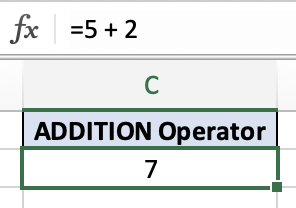ADDITION Operator (+) - Excel
Overview
The Addition operator (+) in Excel is a useful tool for performing mathematical calculations. This operator allows users to add values, cells, or ranges, which makes the creation of complex formulas possible.
Syntax:
=number1 + number2
Here, replace "number1" and "number2" with the specific cells, values, or ranges you want to add together.
Example: specified cells
In this example, the Addition operator is referencing specified cells to do its calculation. Cell C2 equals 1 and cell D2 equals 2, when we add them up using the Addition operator the output is 3.
Example:
=C2 + D2
Example: specified values
In this example, the Addition operator is referencing specified values within the cell to do its calculation. The values 5 and 2 are hardcoded into the cell and the final output is 7 when they are added up.
Example:
=5 + 2
Example: specified ranges
In this example, the Addition operator is referencing specified ranges to do its calculation. C2:C11 is the first range and D2:D11 is the second range. When we add up the ranges using the Addition operator, the calculation automatically goes down each row and sums it up.
Example:
=C2:C11 + D2:D11




